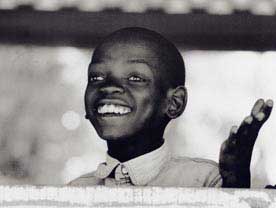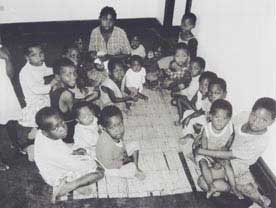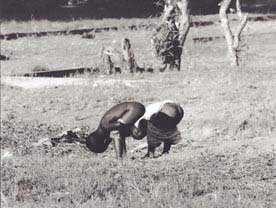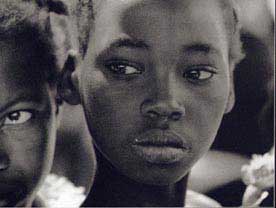



IL TERZO MONDO
Trenta milioni di persone muoiono di fame ogni anno. Eppure le risorse del nostro pianeta sarebbero in grado di nutrire il doppio dell'attuale popolazione terrestre. Malgrado lo sviluppo tecnologico ed economico, lo scandalo della fame nel mondo non sembra avere fine. Anzi raggiunge proporzioni sempre maggiori. Gli ultimi dati dell'ONU sostengono che il 15% degli abitanti della terra consuma il 56 % delle risorse: la denutrizione quindi è un problema politico - sociale, legato a interessi, consumi, stili di vita: a complessi equilibri di potere e conflitti etnici.
___________________________________
«Principale responsabile della denutrizione e della fame
sul nostro pianeta è la distribuzione ineguale delle ricchezze.
Un'ineguaglianza negativamente dinamica: i ricchi diventano sempre più
ricchi, i poveri sempre più poveri. Nel 1960 il 20% degli abitanti più
ricchi della terra disponeva di un reddito 31 volte superiore rispetto a
quello del 20% degli abitanti più poveri. Nel 1998 il reddito del 20% dei
più ricchi era 83 volte superiore a quello del 20% dei più poveri.
Le 225 fortune più grandi del mondo rappresentano un totale di oltre
mille miliardi di dollari, ossia l'equivalente del reddito annuale del 47%
più povero della popolazione mondiale, circa 2,5 miliardi di persone.
Negli Stati Uniti il valore totale netto della fortuna di Bill Gates è
uguale a quello dei 106 milioni di americani più poveri».
«È
dunque l'attuale giungla del capitalismo selvaggio che è necessario
civilizzare. L'economia mondiale è nata dalla produzione, dalla
distribuzione, dal commercio e dal consumo alimentare. Affermare
l'autonomia dell'economia rispetto alla fame è un'assurdità, o peggio
ancora, un crimine. Non si può delegare al libero mercato la lotta contro
il flagello della fame per saziare l'umanità.»
Tratto dal libro di Jean Ziegler: " La fame nel mondo
spiegata a mio figlio "
.
.
THE THIRD WORLD
Thirty million people starve every year. Yet the resources of our planet would be able to feed the double one some actual terrestrial population. Despite the technological and economic development, the scandal of the hunger in the world doesn't seem to have end. Rather it always reaches greater proportions. The last data of the U.N. sustain that the 15% of the inhabitants of the earth consume the 56% of the resources: the malnutrition therefore it is a political problem - social, tied up to affairs, consumptions, styles of life: to complexes equilibriums of power and ethnic conflicts.
________________________________________________
«Principal responsible of the malnutrition and of the hunger on our planet it is the unequal distribution of the wealths. An inequality negatively dynamics: the rich ones become more and more rich, the poor poor men more and more. In 1960 the 20% of the richest inhabitants of the earth had an income 31 times superior in comparison to that of the 20% of the poorest inhabitants. In 1998 the income of the 20% of the richest was 83 times superior to that of the 20% of the more poor men. The 225 greatest fortunes of the world represent a total of over thousand million dollars or rather the 47% annual income equivalent more poor man of the world population, around 2,5 million people. In the United States the clean total value of the fortune of Bill Gates is equal to that of the 106 million of poorer Americans».
«It is therefore the actual jungle of the wild capitalism that is necessary to civilize. The world economy was born from the production, from the distribution, from the commerce and from the food consumption. To affirm the autonomy of the economy in comparison to the hunger is an absurdity, or worse anchor, a crime. You/he/she cannot be delegated the struggle to the free market against the scourge of the hunger to satiate the humanity.»
.
EL TERCER MUNDO
Treinta millones de personas se mueren de hambre cada año. Sin embargo los recursos de nuestro planeta estarían capaz de nutrir el doble de la actual población terrenal. A pesar del desarrollo tecnológico y económico, el escándalo del hambre en el mundo no semeja tener fin. Más bien alcanza proporciones siempre mayores. Los últimos datos de la ONU sustentan que el 15% de los habitantes de la tierra consume el 56% de los recursos: la desnutrición por lo tanto es un problema político - social, atado a intereses, consumos, alambiques de vida: a complejos equilibrios de poder y a conflictos étnicos.
________________________________________________
Llevado del libro de Jean Ziegler: " Usted hambre en el mundo le explicado a mi hijo"
.
LE TROISIÈME MONDE
Trente millions de gens meurent de faim tous les ans. Pourtant les ressources de notre planète seraient apte à nourrir le double de la population terrestre actuelle. Malgré le développement technologique et économique, le scandale de la faim dans le monde ne semble pas avoir fin. Il atteint ou mieux toujours grandes proportions. Les dernières données de l'ONU soutiennent que 15% des habitants de la terre il use 56% des ressources: le dénutrition donc c'est un problème politique - social, lié aux intérêts, consommations, styles de vie: à équilibres complexes de pouvoir et conflits ethniques.
___________________________________________































































